 Laughter and Othello are strange bedfellows, but I’ve always enjoyed that the title character, one of the more lyrical and expressive in the canon, spends so much stage time wishing he were more articulate: “Rude am I in my speech,” Othello says, “[a]nd little blessed with the soft phrase of peace.” The Moor protests too much and too beautifully; rich, rhythmic, even soaring, his language somehow reveals and negates itself in the same breath.
Laughter and Othello are strange bedfellows, but I’ve always enjoyed that the title character, one of the more lyrical and expressive in the canon, spends so much stage time wishing he were more articulate: “Rude am I in my speech,” Othello says, “[a]nd little blessed with the soft phrase of peace.” The Moor protests too much and too beautifully; rich, rhythmic, even soaring, his language somehow reveals and negates itself in the same breath.
I was reminded of this irony when reading The Lost and Forgotten Languages of Shanghai, another tale of jealousy, betrayal, and exiles in strange lands. For while Ruiyan Xu’s new novel is, in part, a meditation on the failings of language—a study of a family divided by words—the book itself is a testament to language’s power. Blessed with the soft phrases Othello pretends to envy, Xu writes subtly and exquisitely, and she has delivered a brilliant debut.
Set mostly in Shanghai in 1999, The Lost and Forgotten Languages of Shanghai begins with an explosion. A gas leak ignites, leveling a hotel; and when Li Jing, an investment banker, emerges from the wreckage, his body is intact (mostly), but he suffers from unusual brain damage. Now unable to speak Chinese, the only language his wife Meiling knows, Li Jing comes under the care of Rosalyn, an attractive American doctor. In the months that follow, Li Jing wrestles with his limitations, Meiling takes over his investment business, and the family threatens to break apart under the strain. Throughout the novel, Xu moves a rich cast of characters through varied estrangements and reconciliations. Each character, in turn, becomes a foreigner of some kind, and each will find some unexpected solace among strangers. More than just a single family’s story, this novel is an elegant and quietly profound chronicle of loss and recovery.
The novel first came to my attention years ago, when the author workshopped an early draft through our writers group. Last week Xu and I caught up at a food court in Manhattan’s Financial District.
Interview
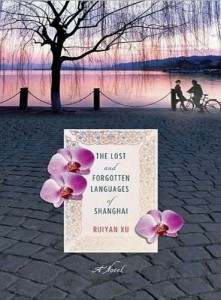 BRIAN SELFON: In The Lost and Forgotten Languages of Shanghai, all three protagonists at times feel estranged and isolated from their surroundings. Why do outsiders fascinate you?
BRIAN SELFON: In The Lost and Forgotten Languages of Shanghai, all three protagonists at times feel estranged and isolated from their surroundings. Why do outsiders fascinate you?
RUIYAN XU: We can start with the obvious—I moved to the U.S. when I was 10, and I was the outsider. I didn’t understand the language, I didn’t know the culture, and in my elementary school class, I was totally lost. I still feel lost sometimes—albeit to a lesser extent. Because I didn’t grow up here, there are references I miss, a kind a shared history or feeling that Americans have who grew up here together, watching the same TV shows, seeing the same events through the same perspective. And so I find myself, sometimes, feeling as though I’m watching things from a distance when I am supposedly participating in them. We can call that “Ruiyan as Outsider, Part One.”
“Ruiyan as Outsider, Part Two” started when I was 18, visited China, and became an outsider again. My skills in the Chinese language had deteriorated because I didn’t use it much. I spoke English, read English, wrote English everyday for eight years. And so speaking to everyone in Chinese—family members, passersby, shopkeepers—became incredibly awkward.
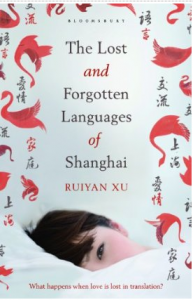
The UK book cover
Simultaneously, in Shanghai, culturally, even physically, everything had changed so much—it didn’t feel like a homecoming. Or, at least, it didn’t feel like only a homecoming. And I had changed too, of course. So even if China had somehow frozen in time, I wouldn’t have been able to just step back in.
Of course I’m not the first person to experience or try to write about this feeling. Immigrant fiction, for example, often deals with the sense that you’ll never feel entirely at home in either culture. Non-immigrant writers know and deal with this, too. Writers can almost be defined as professional outsiders. It’s just part of the job. You often have to step outside of a situation to observe it—to choose the right details—to reshape a mess of events into a narrative.
What did you research for your novel, and what did you make up?
The story takes place in the summer of 1999. I lived in Shanghai during that summer, and I probably couldn’t have set the novel in Shanghai during any other period. When I came back and began writing the book, my memories determined, or at least informed, how I depicted the city in my book. I drew on specific images and scenes that I could recall. But just as important was the feeling the city had while I lived there—a mixture of old and new and glittering and impoverished. So even when I made things up, I stuck to the ambiance I experienced firsthand. Generally, though, the book’s interior spaces were imagined, though perhaps informed by specific memories. Outside spaces tended to come from what I could more specifically recall.
My book follows a character who loses the ability to speak. His condition is called aphasia. I first read about aphasia during college, and I immediately felt some personal connection to the disease—a sense of recognition. Moving to the U.S. as a child, fighting through a new language, and then later, losing my original language… aphasia seemed like an exaggerated, accelerated version of what I had experienced myself. So even before I started writing my novel, I had studied it through my coursework in cognitive science and neuroscience.
Probably no two writers will agree on how to research for fiction. My method is to read as much as possible on the topics or themes relevant to the story I’m writing—to read widely, but also to read haphazardly. Eventually I decide I’m ready to write. But it’s hard to write with a medical text next to you and the Internet open on your laptop. So I take all of the books and articles and whatever else I’ve read and put it away. And then I just write. My assumption is that the prep work will inform my writing, that all the information I picked up will come out almost unconsciously.
At certain points during the revision process, I had to go back and fill in details—and I needed to do supplemental research. I’d check on things I thought I had made up—little details of the book—and sometimes they turned out to be true. Who knows, maybe I read about things similar to those details during my initial research, put them into the novel without remembering where I’d gotten them from, and now was relearning them all over again. Or maybe I just guessed right. Anyway, in terms of the medical research, I sent my manuscript to a doctor friend to make sure I didn’t get too much wrong, and was quite relieved when she gave me her approval.
You’ve spent time at several artists’ colonies during the process of writing this novel. How have they affected your work?

Virginia Center for the Creative Arts / photo from the VCCA website
The practical aspect is hard to overvalue. Simply put, as someone who works full-time, I wouldn’t have finished my novel without the help of these incredibly generous institutions. Colonies give you time and space, a chance to make writing your workday. There’s something amazing–and incredibly challenging—about having nothing but the blank screen on your “to do” list for the day, day after day.

Images from Ragdale / from the Ragdale.org website
It takes away your excuses, your procrastinations, and forces you to be workmanlike. F. Scott Fitzgerald said that all novelists must have a touch of the peasant—you have to put in the time, you have to have patience, you have to put up with drudge work, and you have to return to that drudge work day after day. Colonies let you make writing your full-time day job, even if it’s just for a month or two.
There’s also a motivational upside. I don’t have an MFA in writing, and when I was accepted by my first colony, I had never published anything. Writing was an “on the side” thing that I did—and I definitely did not call myself a writer. Being accepted by that colony—and by other colonies in the following years—gave me a sense of validation. Someone is giving you space and time and financial support—these are amazing gifts. When you’re just getting started, this can mean confidence, and it can be just as invaluable as the practical benefits.
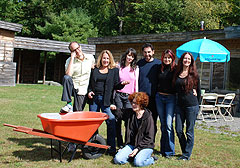
Writers at the Millay Colony (Austerlitz, NY) / from http://www.millay.org
Also, writing is such a solitary activity. It always is, and it always will be. But colonies surround you with other writers and artists, people who are going through the same struggles. You get a sense of community there, which is good in itself and also good for your writing. You learn things from artists in different disciplines. I once talked about rhythm with a composer at a colony, and he said something like “when the rhythm is too perfect, you have to disrupt it every once in a while.” I loved that!
What writers helped inspire this novel? Who influences your writing, and how?
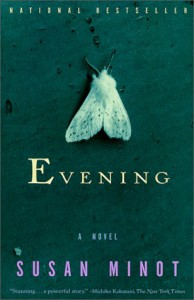 I was just graduating from college when I started this book. I was reading Marguerite Duras, Michael Ondaatje, and Susan Minot, and all of them had at least some influence on my style. The style of those writers, at that formative age, definitely penetrated. I responded to the saturation (for lack of a better word) of their prose, I think, and wanted to create that feeling in my own work. But my style has changed too, over the years. Prose style, for me, was and remains a moving target, one I think about a lot, and something I often question myself about. I will always be in love with words and sentences, but these days I find that my writing feels a little looser, my sentences aren’t quite so careful. It’s definitely been interesting.
I was just graduating from college when I started this book. I was reading Marguerite Duras, Michael Ondaatje, and Susan Minot, and all of them had at least some influence on my style. The style of those writers, at that formative age, definitely penetrated. I responded to the saturation (for lack of a better word) of their prose, I think, and wanted to create that feeling in my own work. But my style has changed too, over the years. Prose style, for me, was and remains a moving target, one I think about a lot, and something I often question myself about. I will always be in love with words and sentences, but these days I find that my writing feels a little looser, my sentences aren’t quite so careful. It’s definitely been interesting.
It’s hard to say that other writers are direct influences on this book. There are, of course, writers I love (W.G. Sebald, Marilynne Robinson, Alice Munro), but they are all geniuses. Geniuses are impossible to crib.
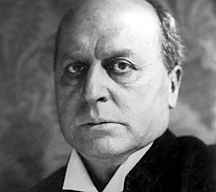
Henry James
At one point, when I was struggling with the structure of the novel, trying to figure out its shape and pacing, I was drawn back to my some of my favorite 19th and early 20th century writers: George Eliot, Henry James, Edith Wharton. They wrote about flawed men and women, about the links between marriage and money, about bad choices and lack of foresight. And so much happens in all those books! So those novels made me think about my characters in a different way—about how they, despite their best efforts, were trapped by the world around them, by their languages and cultures and circumstances, by the society around them. Maybe the choices they made were the only choices they could make.
Apart from books, did other works of art play a role in the creation of The Lost and Forgotten Languages of Shanghei?
That’s a difficult question to answer. I don’t know if any works of art directly played a role. I did listen to a lot of Arvo Pärt during the writing, but it wasn’t so much an inspiration as it was an accompaniment.
The messier answer, and probably the more important one, is that just about everything that passed through my life during the years I was writing my book could have played some role in how I wrote it.
It’s one of the advantages of writing a novel. You spend so much time with it that you start to see the world through the prism of the book. Everything is potential material. You notice new things, notice old things in a different light, notice everything more intensely through whatever you’re working on. Something you overhear, a work of art you see, some random gesture or the shape of a room—anything can fit into a character’s life or plug into some dramatic moment. This is one of my favorite things about writing—the way it allows you to see the world differently, as if writing was actively sharpening your vision.
It’s even more fun when this happens by accident. You’ve stepped away from the book and you’re going through everyday life, and the novel is hidden away but still shaping itself in the back of your mind, and then all of sudden you see or hear something that just drops into place and completes a scene.
To capture some of these things, I take notes, especially if I’m in the middle of working on something. Maybe the notes make it into the book, but more often than not I don’t look at them again. I think taking notes just trains me to observe, to take in details and be able to evoke them when they’re needed. You grow extra sensors when you’re writing—does that sound silly? The world becomes more alive to you. Some of what you see is terrible, and sometimes things are so strange or beautiful that you can’t quite believe it. And all of it makes me more engaged with being alive, and I hope it makes me a better writer. It definitely makes me a better person.
Further Links and Resources
– Read an excerpt from The Lost and Forgotten Languages of Shanghai on the author’s website.
– In August, Xu wrote about a two-part piece on Shanghai for Elle.uk; read Part I and Part II.
– Book Page‘s Abby Plesser talked to Ruiyan Xu at BEA about her novel:
– Here is a recent opinion piece by Xu in the New York Times, about language and the search engine Baidu.
– On Galleycat, Xu offers advice about starting a successful writing group.
– Xu has also mentored young writers through the organization Girls Write Now. If you’re a professional woman writer and would be interested in mentoring, read more about it. Or learn more about more flexible volunteer opportunities.








